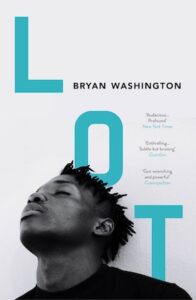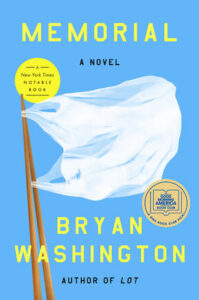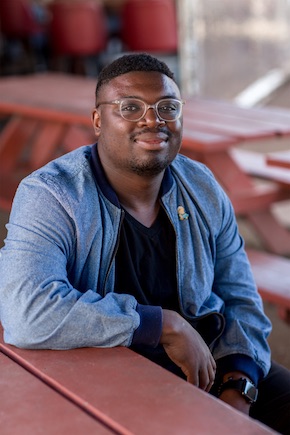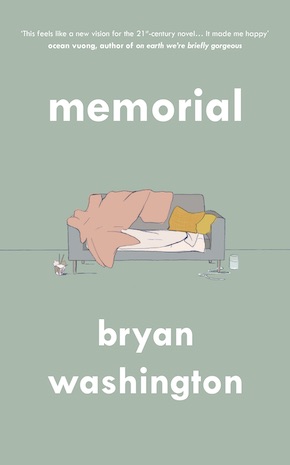Bryan Washington: Neighbourhoods
by Mark ReynoldsBryan Washington’s debut story collection, Lot, a sweeping overview of Houston’s ethnically diverse communities that dips in and out of the life of a gay, mixed-race restaurant worker, was the winner of the 2020 Dylan Thomas Prize and won plaudits from everyone from Ann Patchett and Kiley Reid to Barack Obama, who named it one of his favourite books of the year. He has followed this up with the novel Memorial, which again begins by navigating queer life in Houston, this time from the perspective of Benson (Ben) and Mike, a Black and Japanese-American couple who have been together for several years, and whose relationship is in something of a rut. When Mike learns that his estranged father Eiju is dying of cancer back in Osaka, he flies out to say goodbye – at the very moment his mother Mitsuko is flying into Houston to visit. Disgruntled Ben is left to keep house with Mitsuko, and the first third of the book is squarely from his perspective as he navigates his work at a children’s day-care centre, visits to his own booze-soaked dad and his peculiar new domestic arrangements, with barely a peep from Mike until a voicemail that says Eiju has died and he’s coming home.
The narrative then switches focus back to Mike’s arrival in Japan, and begins a moving tale of adjustment and reconciliation as Mike helps out and gets to know the locals at Eiju’s micro-bar and the latter’s health visibly fails. It’s a smart and effective trick, as we realise we’ve only been paying attention to half the story, and by the time Ben and Mike are reunited, we are invested in both men’s hopes, concerns and future plans, and curious to see whether or where their relationship might pan out.
I spoke to Bryan on Zoom the morning after Trump supporters’ deadly storming of Capitol Hill, which set in motion this singularly divisive president’s unprecedented and wholly agreeable second impeachment and final curtain call. It was heartening to hear that Trump’s chaotic reign appears to have had little impact on the daily lives of many inhabitants of the Lone Star State.
Mark: Most outsiders’ impressions of Texas would probably revolve around cowboys and oilmen, perhaps the Bushes and the Ewings – although Attica Locke’s Highway 59 novels, the films of Richard Linklater, or David Mackenzie’s Hell or High Water each tell a completely different story. How would you define your Texas? Is it purely confined to Houston?
Bryan: In a lot of ways, at least within the narratives I write, Houston is Texas for me, because Houston is where I’ve spent the breadth of my time, and certainly most of my emotional time. And it feels like a gift in a lot of ways to have a text that can be in conversation with Locke’s, that can be in conversation with Linklater’s to various degrees, but Houston has been a deeply warm city in my specific experience, it’s been a deeply welcoming city and a deeply diverse city – although that might go without saying. So I’m really trying to find ways to showcase that community in a narrative sense – if not writing it myself, then I’ll be seeking out those stories from other folks.
Quiet as it’s kept, the American South is the most diverse region in the States, and that fact can often get lost in the midst of the cowboy, in the midst of the religious fanaticism.”
So do you identify with other parts of Texas at all?
That’s kind of a tricky question, and I feel I might get in trouble answering it. I am a Houstonian, so I am a Texan. So is a Texan like a Houstonian? Not necessarily. But I think that if nothing else, the fact that you have so many different identities, so many different communities within Texas itself and within the South, really speaks to what a dynamic place it is. I mean, quiet as it’s kept, the American South is the most diverse region in the States, and that fact can often get lost in the midst of the cowboy, in the midst of the religious fanaticism. But that you can have so many places that are so different from one another existing in tandem feels like a pretty remarkable thing.
Politically, Texas as a whole seems like a microcosm of the divided country, with large Republican areas interspersed with Democrat-supporting cities and counties scattered mostly at the edges. How did Trump’s tenure as President play out in Houston specifically?
Houston is kind of a strange case, because it’s a city within a region that is so characterised by its diversity and its marginalised communities that on a micro level in relation to the rest of the country, there wasn’t a whole hell of a lot that changed, as far as national laws enacted, or efforts at laws enacted, and as far as the general tone that folks would navigate from area to area. Whether it was a slight increase in tension in certain spaces, or a slight increase in the brassiness of certain folks in certain places, that was certainly present, but it wasn’t, at least in my experience, exacerbated to the extent that could be found in a myriad of other cities and a myriad of other locales in Texas, let alone the rest of the country. So in the midst, and certainly at the end of Trump’s tenure, Houston felt and still feels very much like home and like a very warm place to be.
What do you suppose will now be Trump’s legacy for the country at large?
Well, you know, it was a campaign and ultimately a presidency that was built on white supremacy, and that was built on patriarchy and misogyny, xenophobia, homophobia, Islamophobia, and that has come to a head in a way that feels very defining. Nor does it feel like a surprise. We knew that this man was a racist going in, despite many people’s efforts to separate him from that fact. But I generally prefer to spend my time thinking about the efforts of organising, the efforts of the activism of marginalised communities and folks working for those marginalised communities. They’ve just done so much work within their respective spaces for folks that they care about, so I’m just hoping to see more of that, and heartened at having seen so much of it.
You’ve lived in Houston most of your life, but were born in Kentucky and spent childhood summers in Florida. To what extent, if at all, did those other places shape your worldview?
I’m sure they shaped it, but the extent to which they shaped it I don’t feel that I can process just yet, I might need a bit more distance. But if nothing else it exacerbated just how special it felt to live in a place like Houston with its diversity, with its acceptance. Seeing it refracted off of other locales, other places I spent time around, really showed just how unique that was.

“A treat and an inspiration to witness.” Ocean Vuong
Your story collection Lot charts the geography of Houston’s ethnically diverse neighbourhoods at a time when they are gentrifying and white folks are moving in. Have those neighbourhoods, and the Third Ward of Memorial, irreversibly changed?
I’m somewhat tentative to say ‘irreversibly’, but yeah, significantly. Over the course of writing Lot, the neighbourhoods that were being depicted, whether it was East End, whether it was the Heights, were in the midst of mass gentrification. In a lot of ways, Lot itself has been a time capsule for what those neighbourhoods were, because they are no longer those things. A lot of the buildings that were described, a lot of the coffee shops just aren’t there anymore, and the gentrification and the reverberations of the gentrification the characters were navigating and reckoning with have come to full fruition. Memorial’s a bit closer to the present situation in that so many of the characters are aware of that gentrification, they’re aware of its reverberations and they live alongside it, which feels very much like the general way of things in this particular moment.
In both books, it’s refreshing to see ‘whiteboys’ and ‘whitegirls’ marginalised at the periphery of the majority population. Was this intended as a reversal of the norm in American life, or just a way of telling it as it is?
I think it’s much more of the latter. If Lot and Memorial were written with the white gaze in mind, then the vernacular the characters use would reflect that. But because they are of their communities, whether it’s Ben, whether it’s Mike, whether it’s Nicholas, the recurring narrator of Lot, they’re not really focused on whether their respective vernaculars, their respective revolutions are going to be understood by white folks, or whether they’re going to be internalised or how it’s going to be articulated by white folks, because that is not who they spend the breadth of their time around, and that’s not their focus. So they talk the way that they talk because they are what they are and they hang out with the folks that they do. In the end I’m just trying to paint these very singular, specific pictures of who these folks are, and to have a clear sense of how they move through the world.
Given the city’s demographics, it’s no surprise there’s a mixed-ethnic relationship at the heart of Memorial, but I wouldn’t have necessarily guessed at the outset that Ben would have hooked up with a Japanese-American, or that half the book would play out in Osaka. Why did you make that choice, and where does your own fascination with Japan stem from?
Houston is a city that is so defined by the rhythms of its Asian and Asian-American community, its Latinx community, by its Black community that it would’ve been intellectually dishonest, and emotionally dishonest, to write a narrative in which characters weren’t interacting across communities, between communities and within communities, and in many ways Ben and Mike and their relationship and what it ultimately becomes is born of that. I was really lucky, prior to the pandemic, to have gotten to spend a decent amount of time in Japan. For a while I would go once a year, mostly to visit friends, and what really stood out to me, and what surfaced after not very long at all was that there was a warmth of feeling among the residents of Osaka that felt really singular and that I had only ever experienced before in Houston. So much of writing Memorial was trying to figure out what the line between those two locales looked like, how much pressure it could take, and how the residents of those respective communities were able to benefit from it and how they worked around it.
That puts me in mind of Nick Bradley’s The Cat in the City, in which he makes clear that Japanese people from outside of Tokyo find the capital totally alienating.
I haven’t read it yet, but I have it cued up and I’m really excited to read it – the ideas of alienation, of what a city is and can be and how it changes from person to person, are concerns that I find myself circling around constantly and consistently, largely because it doesn’t feel as though there’s a definitive answer, and the answer that any particular person comes up with is just one point change over time, depending on the context in which they find themselves, depending on where and who they find themselves around.
Did you find anything like the same warmth in Tokyo that you found in Osaka?
You know, I haven’t spent as much time there. If and when things open up and I get to spend a little bit more time then I’ll be able to think through it.
What was important to me was to write a narrative that was illustrative. Simply trying to figure out who these characters were and how they related to one another and how that changed felt like a challenge and the goal.”
You pitched Memorial as a ‘gay slacker dramady’, and have also described it as a ‘lower-case love story’ and a ‘traumedy’. Are you any closer to refining your elevator pitch? Or would that be a fruitless exercise?
Ha, a fruitless exercise – I think you’re right about that! A lot of work that went into finishing the novel, to get to the end of it over the course of however many years, was to do with not being able to condense it. I didn’t know how the novel would end until I actually reached the ending, and I couldn’t reach the ending until I had a familiarity with who the characters were, what they cared about, how they changed and how they could change and how they wouldn’t change and what concessions they’re able to give one another. So the lack of a clear-cut answer felt and feels really important to me as far as the larger narrative is concerned.
It’s kind of infuriating that Ben and Mike can’t make up their minds whether or not to stick together. Is that a gay slacker thing, or would you say it’s typical of an entire generation?
I think it’s a human thing, you know, inconsistency, unreliability…
And of course Mitsuko went through a similar hesitancy with Mike’s dad, before making the decision to cut him out of her life.
Yeah, what was really important to me was to write a narrative that was more illustrative than prescriptive, or rather not prescriptive but entirely illustrative. So in lieu of saying ‘this is how a relationship should be’ or ‘this is how a relationship will end if x,y,z happens’, simply trying to figure out who these characters were and how they related to one another and how that changed felt like a challenge and the goal. So whether it was Ben and Mike, whether it was Mitsuko and Eiju, whether it was Ben’s parents, whether it was their friends and their respective revolutions, giving characters space to make decisions and to come back from those decisions or not, and to have to reckon with them and change who they are or not, felt really important to me – giving each character the autonomy to live a full life and be many different things at the same time.
We start with Ben, switch completely to Mike on the other side of the world, and then we’re back with Ben, wit the effect that the reader has a fuller picture than either of them can really understand. At what point in the writing of it did the three-part structure fall into place?
It was clear from the outset that I would want to have near-equal space given to Ben and Mike over the course of the text. In a story that is centred around this very particular relationship, it would’ve felt dishonest to me to only show it from one vantage point, or to only show it from one moment or one voice. So having Ben and Mike speak to their respective experiences, whether they were experiences that they had alone, whether it is an experience that we see from Ben’s vantage point and then from Mike’s vantage point or vice-versa, and giving all that to the reader for them to decide what the relationship is on their own, felt like a way to give a more comprehensive portrait of what this relationship was, and what it could be going forward.
Memorial itself was a very short story to begin with, but it was a story that wasn’t going anywhere. I found myself constantly turning back to the characters, to the concerns and questions they had for one another.”
The headline to the New York Times review, which was otherwise fair and balanced, suggests Ben and Mike are “divided by race, class and culture”. Those are their differences, for sure, but isn’t it their nonchalance and existential coasting that really threaten to split them apart?
I stay away from most reviews, so I can’t speak to the review specifically, but I agree. The respective races of the characters, the respective sexualities of the characters, the respective cultures the characters were born into certainly define them, but whether it divides them isn’t something that I would co-sign, because Memorial is a story of how folks can come together in the midst of those things as opposed to despite those things or as a rebuke to the differences between them. So that nonchalance in a lot of ways carries over between every single one of the characters, and maybe that’s the true lag between them.
You wrote the story collection and the novel back-to-back. Did they feed off each other? Were there scenes deleted from the novel that resurfaced as standalone stories, or episodes that started out as story ideas that slipped into the novel?
That’s a good question, because Memorial itself was a very short story to begin with, but it was a story that wasn’t going anywhere because it was one that I felt as though I should write rather than a story that I wanted to write. But I found myself constantly turning back to the characters populating Memorial, to the concerns and questions they had for one another, and after I’d spent however long doing that, and after the encouragement of my agent and of friends who’d heard me talk about the story, it really pushed me to start to plot what Memorial ultimately could be.
Food plays a big part in both books. Are you as food-obsessed as your characters?
Oh, I don’t know if it would be fair to make a self-assessment, but I certainly think about food a good deal. Not just food, but also the ways that it can be utilised to communicate or not, or cross a bridge or not, and how food exists as a language in and of itself in the midst of so many other languages that a person or a character might be juggling or navigating simultaneously.
It’s certainly a very cross-cultural thing to eat out in Houston.
Yeah, for a while Houston was the city that ate out the most of any city in the States. I think we’ve since given up that particular mantle, but because it’s so characterised by the many different kinds of folks that are living here, and you constantly have folks dipping and diving from restaurant to restaurant, it’s a really beloved place to get to eat around.
Raven Leilani’s Luster, which I just read, has taken black slacker fiction to new levels, and Ocean Vuong’s On Earth We Are Briefly Gorgeous, which you’ve also praised, is a remarkable, tender depiction of race, class and sexuality. Which other younger writers do you identify with and admire?
Ocean is a friend, and I so admire the work that Raven does and will surely continue to do. I’m a big fan of Candice Carty-Williams’ Queenie, Samantha Irby and her essay collections I think are really just the best. I’m a big fan of K-Ming Chang and her book Bestiary, as well as Alexandra Chang’s Days of Distraction, and I thought Elaine Castillo’ America Is Not the Heart was just paradigm-shifting in a lot of ways. And I’m a really, really huge fan of Helen Oyeyemi and so enjoyed Peaces, which comes out in the States in April, and all of her work was deeply influential to me as I was making my way around what narrative could be and what sort of narratives I wanted to tell.
It feels like a really big gift to work with A24 and the Rudin team. We’re pretty deep into the process of trying to figure out how to make it work, and it’s been an exciting time.”

US edition (Riverhead Books)
Memorial was optioned for TV right before it was published in the States, and you’re on board to write the screenplay. Anything more to report on that at this stage?
Yes and no. What I can say is that we are well into the midst of writing it, and well into the process of plotting through the scripts. We’re at the outset, but still pretty far into the casting questions, and it feels like a really big gift to work with A24 and the Rudin team because they are approaching the story and what will ultimately be the show from the position of ‘what do we collectively want to watch; what is the sort of thing we would watch and enjoy?’, as opposed to ‘what’s the sort of thing that would be palatable to the largest amount of folks?’ So we’re pretty deep into the process of trying to figure out how to make it work, and it’s been an exciting time.
Has there also been film or TV interest in Lot?
Lot has been optioned and it is actually in production right now. I’m not nearly as deep into the production as I am in Memorial, but I feel just as lucky to get to be working with the folks that are putting Lot together, who have the same keen interest in narrative and context over commercial concerns. So really excited for both projects, and to see how they evolve.
What are you writing next?
That’s a fun question! I’m in the midst of working on the Memorial scripts, so that will take the brunt of my energy over the next however many months. I am working on another project that I think is going to be the next longer project, and I have any number of smaller projects that are going on simultaneously. So it feels like, again, a really big gift to be busy in a moment when so many different things are happening simultaneously, and just trying to tell the best versions of the narratives that I like to tell as I can.
So what do you suppose is the next thing we will see, the Memorial TV show?
Yeah, that’ll probably be the most immediate thing, because that’s well into production, and of course a lot of that will be driven by what the pandemic ultimately throws at us or does not throw at us over the next year or so. But the team’s really, really working on it, we’re pretty deep into it, and it’s just been really exciting to see a project that began the way that Memorial did ultimately go where it’s going.
 Bryan Washington has written for the New York Times, the New York Times Magazine, New York Magazine, BuzzFeed, The Paris Review, Boston Review, Tin House, One Story, GQ, FADER, The Awl and Catapult. He lives in Houston, Texas and teaches at Rice University, where he is Scholar-in-Residence for Racial Justice. Memorial and Lot are published in the UK by Atlantic Books.
Bryan Washington has written for the New York Times, the New York Times Magazine, New York Magazine, BuzzFeed, The Paris Review, Boston Review, Tin House, One Story, GQ, FADER, The Awl and Catapult. He lives in Houston, Texas and teaches at Rice University, where he is Scholar-in-Residence for Racial Justice. Memorial and Lot are published in the UK by Atlantic Books.
Read more
brywashing.com
@brywashing
Author portrait © Dailey Hubbard
Mark Reynolds is a freelance editor and writer, and a founding editor of Bookanista.
@bookanista
wearebookanista
bookanista.com/author/mark


